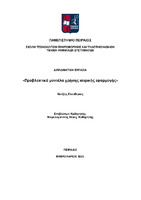Προβλεπτικά μοντέλα χρήσης ιατρικής εφαρμογής

Προβολή/
Λέξεις κλειδιά
Μηχανική μάθηση ; Επιλογή χαρακτηριστικών ; Κατηγοριοποίηση ; Stacked generalization ; Σύστημα έγκαιρης προειδοποίησηςΠερίληψη
Η ραγδαία ανάπτυξη της τεχνολογίας με την παράλληλη αύξηση στον όγκο των ιατρικών δεδομένων στα πληροφοριακά συστήματα των νοσοκομείων, σηματοδότησε την εποχή των Μεγάλων Δεδομένων στον τομέα της υγείας. Η ανάλυση ιατρικών δεδομένων αποτελεί σημαντική ευκαιρία παγκοσμίως για τα εθνικά συστήματα υγείας ώστε να μειωθεί το κόστος και ταυτόχρονα να βελτιωθεί η υγειονομική περίθαλψη. Η αξιοποίηση των τεχνολογιών αυτών γίνεται στο πλαίσιο παρακολούθησης θεμάτων υγείας, καταμέτρησης στόχων υγείας και φυσικής κατάστασης, καθώς και για καταγραφή ιατρικών δεδομένων. Σε ένα τέτοιο πλαίσιο, ο έγκαιρος εντοπισμός χρηστών με κίνδυνο χαμηλότερων ποσοστών συμμόρφωσης και μοτίβων χρήσης μιας εφαρμογής παρακολούθησης υγείας, που υποδηλώνουν κίνδυνο εγκατάλειψης είναι μια ανεκτίμητη ευκαιρία για την εφαρμογή προσαρμοσμένων στρατηγικών παρέμβασης που στοχεύουν στην ανάκαμψη και την αποφυγή αποδέσμευσης των χρηστών. Η παρούσα διπλωματική εργασία ασχολείται με την φετινή έκδοση του παγκόσμιου διαγωνισμού IFMBE Science Challenge 2022, στόχος του οποίου είναι ο εντοπισμός προτύπων πρόωρης εγκατάλειψης σε χρήστες μιας εφαρμογής για κινητές συσκευές παρεμβάσεων με τίτλο Active and Healthy Ageing (AHA). Οι συμμετέχοντες του διαγωνισμού έχουν πρόσβαση σε ένα σύνολο δεδομένων με περισσότερους από 150 χρήστες στη Μαδρίτη που έχουν δοκιμάσει τον αντίκτυπο μιας ψηφιακής εφαρμογής AHA για τη βελτίωση της ποιότητας ζωής τους για τουλάχιστον 6 μήνες στο δίκτυο Moving Active & Healthy Aging. Η πρόκληση του διαγωνισμού, είναι δεδομένου ενός παραθύρου με n=12 διαδοχικών προγραμματισμένων στιγμών απόκτησης δεδομένων, να προβλεφθεί η συμμόρφωση του χρήστη κατά τις προσεχείς 3 προγραμματισμένες στιγμές απόκτησης δεδομένων.
Στο στάδιο της πειραματικής διαδικασίας υλοποιήθηκαν και παρουσιάζονται πολλές διαφορετικές προσεγγίσεις για την πρόβλεψη της εγκατάλειψης. Αρχικά στο σύνολο των δεδομένων και στην συνέχεια με διαφορετικό πλήθος χαρακτηριστικών, ώστε να επιλεγεί το καλύτερο. Συγκεκριμένα προτείνετε μια μεθοδολογία με την χρήση του κανόνα καθαρισμού δεδομένων Neighborhood Cleaning Rule (NCR) και ένας συγκεκριμένος αλγόριθμος ταξινόμησης με την μέθοδο μάθησης Stacked Generalization για την πρόβλεψη της πρόωρης εγκατάλειψης των χρηστών της εφαρμογής παρακολούθησης υγείας. Τα αποτελέσματα δείχνουν ότι ο προτεινόμενος αλγόριθμός ήταν ικανός να προβλέψει την πρόωρη εγκατάλειψη των χρηστών από την εφαρμογή με ποσοστό ακρίβειας 97,6%, ενώ παράλληλα, βάσει της μετρικής που επιλέχθηκε από τον διαγωνισμό σε ποσοστό 93,4%, κάτι και το οποίο φυσικά τον κάνει αρκετά αξιόπιστο, ώστε να χρησιμοποιείται ως ένα σύστημα έγκαιρης προειδοποίησης. Στο τέλος της παρούσας εργασίας παρουσιάζονται αναλυτικά τα συμπεράσματα που προέκυψαν από την έρευνα.


